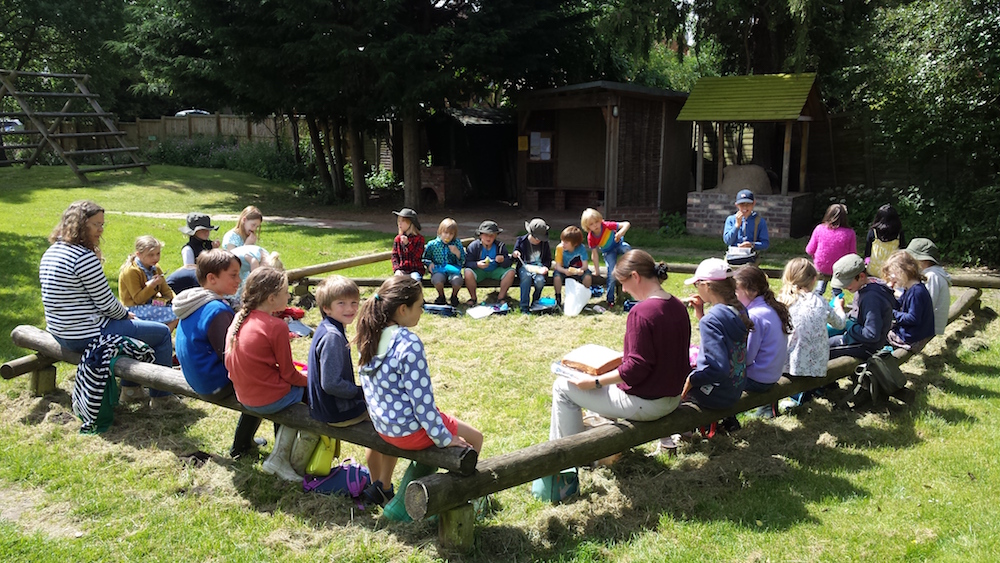Creativity and good health through outdoor play
Posted on 30th Jan 2017 in Which School?, Curriculum, School News
Rachel McCrory, Education Manager, introduces ‘The Alder Bridge Way’, where fresh air breathes life into the curriculum...
Creativity – isn’t this the foundation of a happy and successful life? It’s not necessarily about Art or Music or Theatre, although expressing one’s ideas through art, music and drama is indeed creative.
Rather, it’s skills like critical thinking, flexibility and the ability to imagine another way and try it out: this is what makes an adult successful in whatever field they are working in, whether they are stepping onto a West End stage or navigating a complex legal case.
So how do we become creative adults?
The roots of our creativity as adults are in our games as children. All children are creative, from the moment they are born babies are experimenting with movement, taking immense pleasure in discovering new things they can do with their bodies! From that moment on they are pushing boundaries, trying things out, experiencing ‘what happens when’ and learning more about the world with every step.
A play-based curriculum in the early years gives children the opportunity to learn more, not less. The time that they are not being taught is spent instead on play, during which they are actually engaged in extensive scientific experiments – social, physical and cognitive. They learn how to persuade a reluctant friend to join a game, or how to deal with disappointment. They learn to choose the right sequence of branches when climbing a tree, and that water and earth mixed to the right consistency makes the BEST mud pies. A good early years provider will ensure that children have the freedom to play and therefore to learn.
So, if all children are creative, how do we ensure that creativity is retained through their school years? Well, play doesn’t have to end when school starts. Plenty of time outside for organised games, free play, and formal learning will give children the opportunity to learn and develop through play.
A curriculum rich in experiential learning and a school which values the arts will nurture that creative spark. Exams? They are important too, but at the right time.
Creativity is what enables us to innovate and to problem solve, and the root of this creativity is play.
How about the mental and physical health benefits?
Research has linked sedentary childhood to mental health problems. There is also evidence to suggest that, far from relying on organised sports activities to enable children to experience an endorphin high, it's unstructured, natural space that stimulates a child’s ability to feel energised and to stimulate play and be creative.
What does the research tell us?
So, what do research studies teach us about healthy outdoor play for children?
– Leave the plastic behind. Let the sticks and mounds and hills become the swords, fortresses, and delicious mud pies to boost the imagination.
– Don’t interrupt their play. Being able to take risks and problem-solve helps children build self-esteem, which cuts risks for depression or other mentally stressful states. Children who are regularly exposed to nature have been found to be more resilient to high-stress situations.
– Enjoy the view. Let them take time to look at their surroundings and ‘take it all in’. Restorative and health benefits of nature come just from looking at it. Having green spaces outside of a child’s window could reduce symptoms of ADD.
– Let them build. Constructing forts and dugouts is an amazing way for kids to experiment and learn about natural sciences and their own capabilities.
– Encourage use of all of the senses. Sight and touch are the most commonly used, but hearing and smell are central to really understanding the outdoors, as are tactile experiences.
– Go rugged. Children who play in rocky, uneven, tree-filled areas have better balance and agility than their flatland and concrete counterparts.
At Alder Bridge School in Padworth, Berkshire, as a Steiner-Waldorf school, outdoor play is a fundamental part of the curriculum. With a woodland classroom and plenty of outdoor space, lessons take place outside, whenever its possible.
Children can experience, in a kinaesthetic way, how the subject they are learning affects them physically, emotionally and spiritually. Consequently, the learning ‘sticks’ because they have been fully involved in the experience and been able to use play and creativity to make the subject their own.
So, outdoor play has been proven to improve creativity and mental and physical health. The classroom has a place in our schools but its still good old fashioned play and outdoor experiences that can produce creative, happy and healthy adults, able to face the rigours of our modern world.
For more information about Alder Bridge School, see their profile page on School Search, the online guide to UK independent schools.